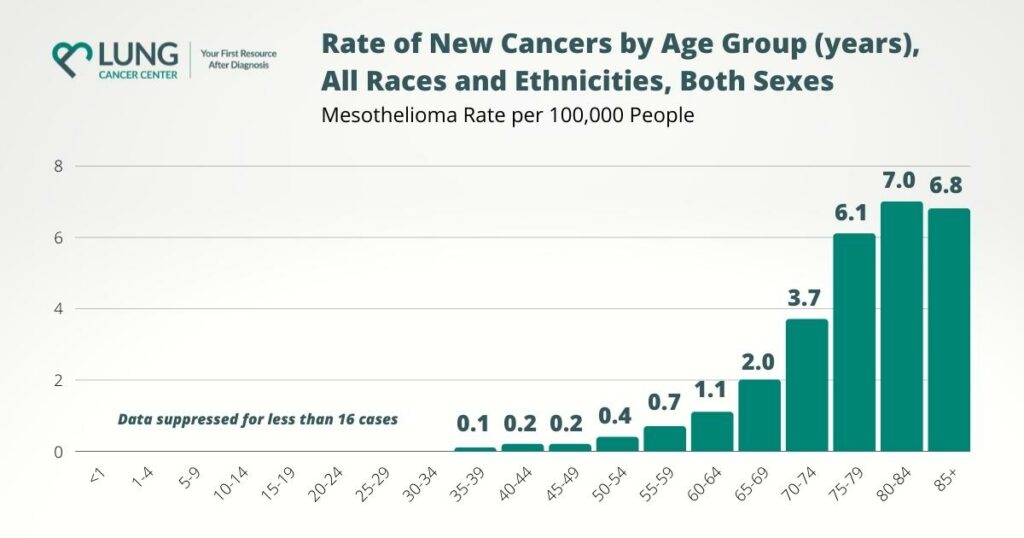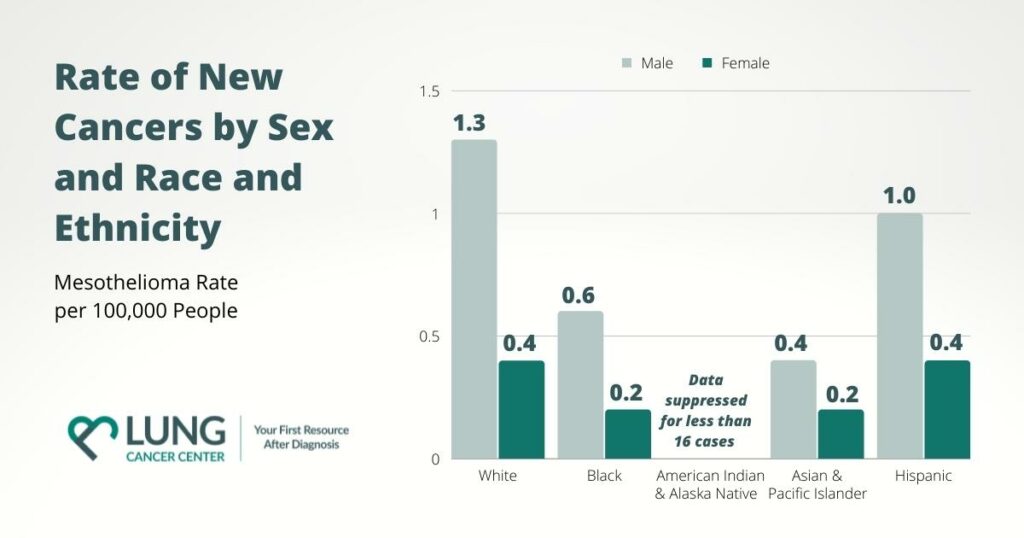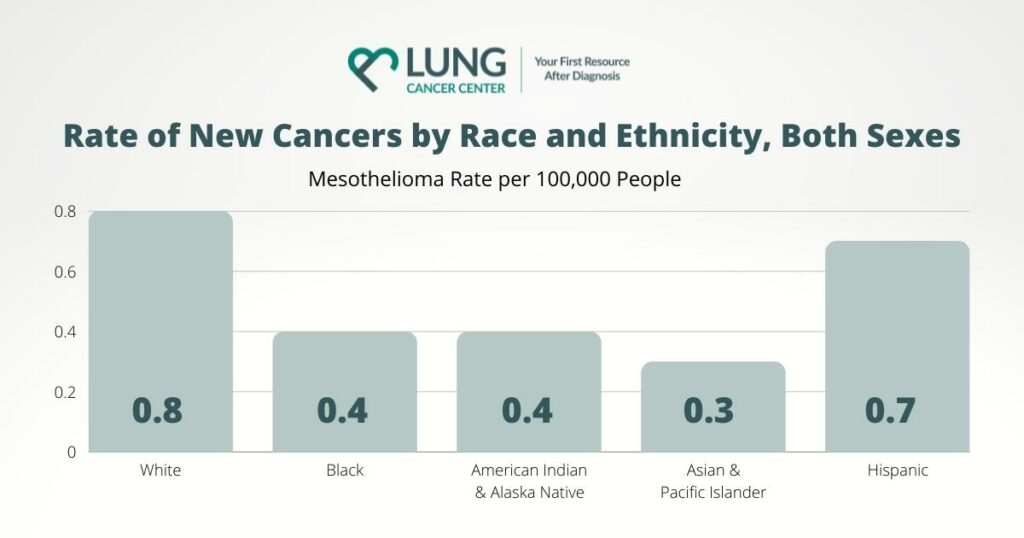Mesothelioma Prognosis
The overall mesothelioma prognosis is poor, however, some people can live as long as 10 years after their diagnosis. A mesothelioma patient's prognosis is dependent on factors such as type, stage, and treatment.

 Does Anyone Survive Mesothelioma?
Does Anyone Survive Mesothelioma?
A mesothelioma patient can survive cancer, but there are several factors that affect a person’s prognosis. A survival projection for mesothelioma can vary based on variables such as type, stage, and treatment. The general life expectancy for mesothelioma varies, however, the five-year survival rate for mesothelioma is typically 10%. Although the prognosis for mesothelioma is typically poor, patients can live for much longer and can even go into remission. Learn more about what life factors could effect one’s mesothelioma prognosis.
What is the Best Prognosis for Mesothelioma?
After receiving a mesothelioma diagnosis, many people want to know how long they can live with mesothelioma. The prognosis for any type of mesothelioma is poor as a multitude of patients pass within the first four to six months after diagnosis and most by twelve months after diagnosis. However, there are some mesothelioma patients that have lived much longer and live as long as ten years after their diagnosis.
There are several factors that contribute to a patient’s prognosis including cancer type, patient age, and stage of cancer. Additionally, there are factors that are within a patient’s capabilities to improve their mesothelioma diagnosis. Quitting smoking, standard treatment, multimodal therapies, and clinical trials can all help a patient improve their malignant mesothelioma prognosis.
Prognosis by Mesothelioma Type
Mesothelioma develops in the lining of different organs throughout the body. Medical scientists classify mesothelioma by location. There are four types of mesothelioma: pleural, peritoneal, pericardial, and testicular. Medical professionals label mesothelioma as pleural when cancer cells form in the lining of the lungs. Peritoneal mesothelioma is found in the abdominal lining and pericardial mesothelioma is located in the heart. Testicular mesothelioma develops when cancer cells form in the lining of the testicles. Each type of mesothelioma has differing prognoses.
- Pleural Mesothelioma: Life expectancy is one to four years after diagnosis
- Peritoneal Mesothelioma: Life expectancy is two to six years after diagnosis
- Pericardial Mesothelioma: Life expectancy is six months after diagnosis
- Testicular Mesothelioma: Life expectancy is undocumented due to its rarity
There are so few cases of testicular mesothelioma that there is very little information about life expectancy. Overall, the prognosis for mesothelioma is poor.

Prognosis by Mesothelioma Stage
There are four primary stages of mesothelioma describing the location, metastasis, and body parts affected.
- Stage 1: Cancer is small and has not spread to other body parts.
- Stage 2: Cancer has grown but has not spread to other body parts.
- Stage 3: Cancer has grown larger and possibly spread to other lymph nodes or tissues.
- Stage 4: Cancer has grown larger and has spread to other organs or areas of the body.
| Stage 1 | Stage 2 | Stage 3 | Stage 4 |
|---|---|---|---|
| 21+ months | 19 months | 16 months | 12 months |
Many mesothelioma patients do not receive a diagnosis until the late stages of cancer. It can be difficult to recognize the early symptoms of mesothelioma as they are so similar to other conditions. However, an early-stage prognosis is much better than a late-stage prognosis, so it is essential to understand the warning signs of mesothelioma.
Mesothelioma Symptoms by Stage
In stage 1 of mesothelioma, cancer tumors do not cause severe symptoms, making it difficult for doctors to diagnose throughout the early stages. Stage 2 mesothelioma symptoms are often described as similar to that of a common cold. During the early stages, many people do not recognize the symptoms as something serious.
By stages 3 and 4, mesothelioma patients begin to notice cancer symptoms. Common signs of late-stage mesothelioma include difficulty breathing, trouble swallowing, and chest pain.
Mesothelioma Prognosis by Demographics
While cancer can affect all people, there are certain populations that are more prone to mesothelioma. Factors such as environment and genetics can lead to a difference in mesothelioma risks. Additionally, there are several occupations and materials that cause mesothelioma and similar conditions.

Understanding Mesothelioma Remission and Recurrence
After a period of undetectable cancer, some mesothelioma survivors will experience a recurrence. A recurrence or remission is a decrease in or disappearance of cancer and its associated symptoms. A publication from the Surgical Oncology & Clinical Practice Journal states that an average of 12% of mesothelioma patients are able to achieve remission fully and become mesothelioma survivors.
Mesothelioma Prognosis After Treatment
Treatment can help relieve symptoms as well as deplete tumors in mesothelioma patients. Treatment typically improves survival rate and prognosis. There are several types of mesothelioma treatment including standard therapies like chemotherapy, radiation, and surgery. By undergoing treatment, a 2015 study reported that 19 peritoneal mesothelioma patients had a 100% 1-year survival rate and a 91% 3-year survival rate.

Does Chemo Work for Mesothelioma?
One of the most common treatment types for mesothelioma is chemotherapy. Chemotherapy can lead to a better mesothelioma prognosis. Chemotherapy is a chemical medication used to shrink or kill tumors. The medication works by killing cancer cells which deplete the tumor fuel. Additionally, chemotherapy can be used in conjunction with other cancer treatments to produce a better prognosis.
Mesothelioma Life Expectancy Without Treatment
Some mesothelioma patients may choose to not undergo cancer treatment. There are several reasons a patient may choose not to receive treatment like a late cancer stage diagnosis or cancer treatment costs, alongside many other possibilities. However, if a patient chooses to not undergo treatment, it will affect their life expectancy and prognosis.
According to a study done by the Society of Thoracic Surgeons, mesothelioma patients that chose to not undergo treatment had an overall survival rate of 10.2 months.
If a patient does not receive standard mesothelioma treatment, they may choose to instead undergo palliative care. Palliative care can make cancer patients more comfortable during their cancer journey. This form of treatment can include pain medication, massage therapy, meditation, nutritional supplements, and other ways to make their final time more enjoyable.
Common Questions About a Mesothelioma Prognosis
You are not at a complete loss after a diagnosis as you can still manage mesothelioma through treatment, healthy living, and maintaining a positive attitude. As you or a loved one fights through a Mesothelioma prognosis, there be more questions that arise on the journey. Below are a few of those questions answered;
- Does my age affect my mesothelioma prognosis?
- Older mesothelioma patients typically have a worse prognosis.
- What is a good diet for cancer patients to improve my diagnosis?
- Fruits, vegetables, and legumes are good foods to add to your diet.
- Should I undergo treatment to improve my mesothelioma prognosis?
- Treatment is a personal decision that you should discuss with your medical team.
These inquiries among many others are frequently asked questions among those with a recent mesothelioma diagnosis. We understand the overwhelming feeling and thoughts that you feel after receiving your mesothelioma cancer diagnosis. At Lung Cancer Center, we have the resources and expertise to help you with medical decisions and legal action. Contact our team today to receive answers to your difficult questions.


